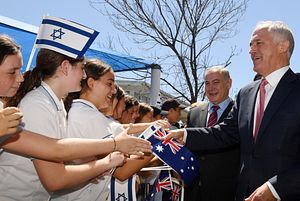On Sunday, Israeli Prime Minister Benjamin Netanyahu wrapped up a 4-day official visit to Australia. Netanyahu’s visit was the first by a sitting Israeli Prime Minister since the country’s founding in 1948, and both the visit and the length of his stay indicated that Australia’s continued support for Israel in international forums such as the United Nations is regarded as increasingly important by Israel.
The visit was deemed of such significance that the Australian Prime Minister, Malcolm Turnbull, saw fit to pen an opinion piece for the national broadsheet, The Australian, welcoming his Israeli counterpart to the country, and taking aim at the United Nations for what he believes are “one-sided resolutions” that are overly critical of Israel. Regarding Israel’s domestic critics in Australia, Turnbull wrote that “[m]any view Israel exclusively through the lens of its conflict with the Palestinians,” adding that “[t]hey demand that the Government take the side of those in the international community who seek to chastise Israel — and it alone — for the continuing failure of the peace process.”
These were words that were greatly welcomed by the Israeli PM who in response to the piece stated, “When I landed, I was given the paper, I was delighted to read it, but it has been absolutely consistent with the friendship that Malcolm Turnbull and his government has shown us and that Australia has shown us over the years.”
Turnbull’s article praised Israel as a “miraculous” country that had been able to flourish despite ever present conflict, “and an almost complete lack of natural resources,” an observation that allowed Turnbull to pivot the visit towards his favorite pastime of discussing the need to enhance Australia’s ability to embrace technological innovative. The Australian government has created five “landing pads” throughout the world for Australian entrepreneurs to “access to some of the world’s most renowned innovation and startup ecosystems,” and the second of these was established in Tel Aviv (after Shanghai, but before San Francisco, Berlin and Singapore).
While Israel is currently only Australia’s 44th largest trading partner, Turnbull sees an opportunity to improve this trading relationship through economic partnerships with Israel’s much vaunted technology industries. This potential also allows him to get away with his rhetorical flourishes about innovation (something his party hates) through the backdoor of supporting Israel (something his party loves). The two prime ministers signed a pair of bilateral agreements during Netanyahu’s visit, one focusing on cooperation around technological innovation, research and development, and the second facilitating greater commercial air transport services between the two countries.
While the Netanyahu’s presence allowed the government a rare period of internal calm from its current dysfunction, the visit instead caused an existential crisis for the opposition Labor Party, and a challenge to traditional bipartisan support for Israel from Australia’s major parties.
Former Labor Prime Minister, Kevin Rudd has called for Australia to formally recognize a Palestinian State. Similar policy shifts have been advocated by another Labor Prime Minister, Bob Hawke, as well as former Foreign Ministers Gareth Evans and Bob Carr. Carr’s commentary on the influence of the Israel-lobby on Australia’s foreign policy has led a war of words between himself and Labor MP, Michael Danby, who is the secretary of the Australia-Israel Parliamentary Friendship Group.
This party infighting over Israel is not just a foreign policy problem for Labor, but has potential electoral consequences. Danby’s seat in Melbourne Ports has the highest concentration of Jewish people in Australia and has been held by Labor since 1906. However, as of the last election, the seat has become a three-way battle between Labor, the Liberal Party and the Greens, and so any shift in Labor policy towards Israel could cause the party to lose a once very safe seat.
Any shift in the Labor Party’s policy would also cause some concern for Israel. Netanyahu’s visit to Australia was designed to sure up its support among the countries it deems friendly to its existence. Israel may be starting to recognize that the world order is moving away from United States’ singular dominance, and that it might need to prepare itself for the possibility of less U.S. support. U.S. President Donald Trump’s lack of foreign policy consistency, isolationist tendencies, and his recent flaky “two-state, one-state” comments during a joint press conference with Netanyahu would have added to a desire to sure up support elsewhere.
Australia’s interests lie in being able to develop a strong trading relationship with Israel. It recognizes the reality of Israel’s existence, and shares a pro-Western culture and a democratic outlook with the Jewish state, alongside significant people to people links. Yet the continued expansion of Israeli settlements in the West Bank, and the lack of progress towards the creation of a Palestinian state remain ethical problems for Australia, that come with domestic pressures. Carefully balancing these factors will continue to form the central platform of Australia’s relationship with Israel.

































